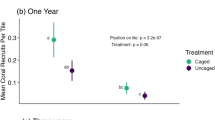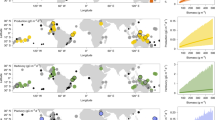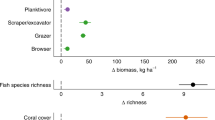Abstract
Coral reefs are being impacted by myriad stressors leading to drastic changes to their structure and function. Fishes play essential roles in driving ecosystem processes on coral reefs but the extent to which these processes are emergent at temporal or ecosystem scales or otherwise masked by other drivers (for example, climatic events and crown-of-thorns starfish outbreaks) is poorly understood. Using time series data on fish community composition and coral and macroalgae percentage cover between 2006 and 2017 from 57 sites around Mo’orea, Polynesia, we found that fish community diversity predicts temporal stability in fish biomass but did not translate to temporal stability of coral cover. Furthermore, we found limited evidence of directional influence of fish on coral dynamics at temporal and ecosystem scales and no evidence that fish mediate coral recovery rate from disturbance. Our findings suggest that coral reef fisheries management will benefit from maintaining fish diversity but that this level of management is unlikely to strongly mediate coral loss or recovery over time.
This is a preview of subscription content, access via your institution
Access options
Access Nature and 54 other Nature Portfolio journals
Get Nature+, our best-value online-access subscription
$29.99 / 30 days
cancel any time
Subscribe to this journal
Receive 12 digital issues and online access to articles
$119.00 per year
only $9.92 per issue
Buy this article
- Purchase on Springer Link
- Instant access to full article PDF
Prices may be subject to local taxes which are calculated during checkout




Similar content being viewed by others
Data availability
All data to support the analyses and conclusions of this study are available online at https://github.com/timothycline/CoralFishStability.
Code availability
All computer code to support the analyses and conclusions of this study are available online at https://github.com/timothycline/CoralFishStability.
References
Hughes, T. P. et al. Coral reefs in the Anthropocene. Nature 546, 82–90 (2017).
Hatcher, B. G. Coral reef primary productivity: a beggar’s banquet. Trends Ecol. Evol. 3, 106–111 (1988).
Hatcher, B. G. Coral reef primary productivity. A hierarchy of pattern and process. Trends Ecol. Evol. 5, 149–155 (1990).
Lewis, S. M. The role of herbivorous fishes in the organization of a Caribbean reef community. Ecol. Monogr. 56, 183–200 (1986).
Carpenter, R. C. Partitioning herbivory and its effects on coral reef algal communities. Ecol. Monogr. 56, 345–364 (1986).
McCook, L. J. Macroalgae, nutrients and phase shifts on coral reefs: scientific issues and management consequences for the Great Barrier Reef. Coral Reefs 18, 357–367 (1999).
Meyer, J. L., Schultz, E. T. & Helfman, G. S. Fish schools: an asset to corals. Science 220, 1047–1049 (1983).
Allgeier, J. E., Layman, C. A., Mumby, P. J. & Rosemond, A. D. Consistent nutrient storage and supply mediated by diverse fish communities in coral reef ecosystems. Glob. Change Biol. 20, 2459–2472 (2014).
Shantz, A. A., Ladd, M. C., Schrack, E. & Burkepile, D. E. Fish-derived nutrient hotspots shape coral reef benthic communities. Ecol. Appl. 25, 2142–2152 (2015).
Folke, C. et al. Regime shifts, resilience, and biodiversity in ecosystem management. Annu. Rev. Ecol. Evol. Syst. 35, 557–581 (2004).
Worm, B. et al. Impacts of biodiversity loss on ocean ecosystem services. Science 314, 787–790 (2006).
McCann, K. S. The diversity–stability debate. Nature 405, 228–233 (2000).
Ives, A. R. & Carpenter, S. R. Stability and diversity of ecosystems. Science 317, 58–62 (2007).
Hughes, T. P. et al. Phase shifts, herbivory, and the resilience of coral reefs to climate change. Curr. Biol. 17, 360–365 (2007).
Graham, N. A. J. et al. Managing resilience to reverse phase shifts in coral reefs. Front. Ecol. Environ. 11, 541–548 (2013).
Holbrook, S. J., Schmitt, R. J., Adam, T. C. & Brooks, A. J. Coral reef resilience, tipping points and the strength of herbivory. Sci. Rep. 6, 35817 (2016).
Hughes, T. P. et al. Spatial and temporal patterns of mass bleaching of corals in the Anthropocene. Science 359, 80–83 (2018).
Holling, C. S. Resilience and stability of ecological systems. Annu. Rev. Ecol. Syst. 4, 1–23 (1973).
Mumby, P. J. et al. Fishing, trophic cascades, and the process of grazing on coral reefs. Science 311, 98–101 (2006).
Green, A. L. & Bellwood, D. R. Monitoring Functional Groups of Herbivorous Reef Fishes as Indicators of Coral Reef Resilience. A Practical Guide for Coral reef Managers in the Asia Pacific Region (IUCN, 2009).
Bozec, Y. M., O’Farrell, S., Bruggemann, J. H., Luckhurst, B. E. & Mumby, P. J. Tradeoffs between fisheries harvest and the resilience of coral reefs. Proc. Natl Acad. Sci. USA 113, 4536–4541 (2016).
Bruno, J. F., Cote, I. M. & Toth, L. T. Climate change, coral loss, and the curious case of the parrotfish paradigm: why don’t marine protected sreas improve reef resilience? Ann. Rev. Mar. Sci. 11, 307–334 (2019).
Brandl, S. J. et al. Coral reef ecosystem functioning: eight core processes and the role of biodiversity. Front. Ecol. Environ. 17, 445–454 (2019).
Mora, C. A clear human footprint in the coral reefs of the Caribbean. Proc. Biol. Sci. 275, 767–773 (2008).
Duffy, J. E., Godwin, C. M. & Cardinale, B. J. Biodiversity effects in the wild are common and as strong as key drivers of productivity. Nature 549, 261–264 (2017).
Allgeier, J. E., Layman, C. A., Mumby, P. J. & Rosemond, A. D. Biogeochemical implications of biodiversity and community structure across multiple coastal ecosystems. Ecol. Monogr. 85, 117–132 (2015).
Mellin, C., Bradshaw, C. J., Fordham, D. A. & Caley, M. J. Strong but opposing beta-diversity–stability relationships in coral reef fish communities. Proc. Biol. Sci. 281, 20131993 (2014).
Nash, K. L. et al. Herbivore cross-scale redundancy supports response diversity and promotes coral reef resilience. J. Appl. Ecol. 53, 646–655 (2016).
Thibaut, L. M., Connolly, S. R. & Sweatman, H. P. Diversity and stability of herbivorous fishes on coral reefs. Ecology 93, 891–901 (2012).
Zhang, S. Y. et al. Is coral richness related to community resistance to and recovery from disturbance? PeerJ 2, e308 (2014).
Clements, C. S. & Hay, M. E. Biodiversity enhances coral growth, tissue survivorship and suppression of macroalgae. Nat. Ecol. Evol. 3, 178–182 (2019).
Bellwood, D. R., Hoey, A. S., Ackerman, J. L. & Depczynski, M. Coral bleaching, reef fish community phase shifts and the resilience of coral reefs. Glob. Change Biol. 12, 1587–1594 (2006).
Burkepile, D. E. & Hay, M. E. Herbivore species richness and feeding complementarity affect community structure and function on a coral reef. Proc. Natl Acad. Sci. USA 105, 16201–16206 (2008).
Mumby, P. J. Phase shifts and the stability of macroalgal communities on Caribbean coral reefs. Coral Reefs 28, 761–773 (2009).
Cheal, A. J., Emslie, M., MacNeil, M. A., Miller, I. & Sweatman, H. Spatial variation in the functional characteristics of herbivorous fish communities and the resilience of coral reefs. Ecol. Appl. 23, 174–188 (2013).
Cheal, A. J. et al. Coral–macroalgal phase shifts or reef resilience: links with diversity and functional roles of herbivorous fishes on the Great Barrier Reef. Coral Reefs 29, 1005–1015 (2010).
Bellwood, D. R., Hughes, T. P., Folke, C. & Nystrom, M. Confronting the coral reef crisis. Nature 429, 827–833 (2004).
Mouillot, D. et al. Functional over-redundancy and high functional vulnerability in global fish faunas on tropical reefs. Proc. Natl Acad. Sci. USA 111, 13757–13762 (2014).
Graham, N. A., Jennings, S., MacNeil, M. A., Mouillot, D. & Wilson, S. K. Predicting climate-driven regime shifts versus rebound potential in coral reefs. Nature 518, 94–97 (2015).
Steneck, R. S., Mumby, P. J., Macdonald, C., Rasher, D. B. & Stoyle, G. Attenuating effects of ecosystem management on coral reefs. Sci. Adv. 4, eaao5493 (2018).
Williams, I. D., Polunin, N. V. C. & Hendrick, V. J. Limits to grazing by herbivorous fishes and the impact of low coral cover on macroalgal abundance on a coral reef in Belize. Mar. Ecol. Prog. Ser. 222, 187–196 (2001).
Harvey, C. J. et al. The importance of long-term ecological time series for integrated ecosystem assessment and ecosystem-based management. Prog. Oceanogr. 188, 102418 (2020).
Robinson, J. P. W. et al. Productive instability of coral reef fisheries after climate-driven regime shifts. Nat. Ecol. Evol. 3, 183–190 (2019).
MacNeil, M. A. et al. Water quality mediates resilience on the Great Barrier Reef. Nat. Ecol. Evol. 3, 620–627 (2019).
Kayal, M. et al. Predator crown-of-thorns starfish (Acanthaster planci) outbreak, mass mortality of corals, and cascading effects on reef fish and benthic communities. PLoS ONE 7, e47363 (2012).
Adjeroud, M. et al. Recurrent disturbances, recovery trajectories, and resilience of coral assemblages on a South Central Pacific reef. Coral Reefs 28, 775–780 (2009).
Adam, T. C. et al. How will coral reef fish communities respond to climate-driven disturbances? Insight from landscape-scale perturbations. Oecologia 176, 285–296 (2014).
Munsterman, K. S., Allgeier, J. E., Peters, J. R. & Burkepile, D. E. A view from both ends: shifts in herbivore assemblages impact top-down and bottom-up processes on coral reefs. Ecosystems 24, 1702–1715 (2021).
Newman, M. J., Paredes, G. A., Sala, E. & Jackson, J. B. Structure of Caribbean coral reef communities across a large gradient of fish biomass. Ecol. Lett. 9, 1216–1227 (2006).
McClanahan, T. R. et al. Critical thresholds and tangible targets for ecosystem-based management of coral reef fisheries. Proc. Natl Acad. Sci. USA 108, 17230–17233 (2011).
Suchley, A., McField, M. D. & Alvarez-Filip, L. Rapidly increasing macroalgal cover not related to herbivorous fishes on Mesoamerican reefs. PeerJ 4, e2084 (2016).
Rogers, A., Blanchard, J. L. & Mumby, P. J. Vulnerability of coral reef fisheries to a loss of structural complexity. Curr. Biol. 24, 1000–1005 (2014).
Hempson, T. N., Graham, N. A. J., MacNeil, M. A., Hoey, A. S. & Wilson, S. K. Ecosystem regime shifts disrupt trophic structure. Ecol. Appl 28, 191–200 (2018).
Mouillot, D. et al. Global marine protected areas do not secure the evolutionary history of tropical corals and fishes. Nat. Commun. 7, 10359 (2016).
Han, X., Adam, T. C., Schmitt, R. J., Brooks, A. J. & Holbrook, S. J. Response of herbivore functional groups to sequential perturbations in Moorea, French Polynesia. Coral Reefs 35, 999–1009 (2016).
Donovan, M. K. et al. Nitrogen pollution interacts with heat stress to increase coral bleaching across the seascape. Proc. Natl Acad. Sci. USA 117, 5351–5357 (2020).
Holbrook, S. J. et al. Recruitment drives spatial variation in recovery rates of resilient coral reefs. Sci. Rep. 8, 7338 (2018).
Doropoulos, C. et al. Characterising the ecological trade-offs throughout the early ontogeny of coral recruitment. Ecol. Monogr. 86, 20–44 (2016).
Russ, G. R., Questel, S. A., Rizzari, J. R. & Alcala, A. C. The parrotfish–coral relationship: refuting the ubiquity of a prevailing paradigm. Mar. Biol. 162, 2029–2045 (2015).
Chung, A. E. et al. Building coral reef resilience through spatial herbivore management. Front. Mar. Sci. https://doi.org/10.3389/fmars.2019.00098 (2019).
Kelly, E. L. A. et al. A budget of algal production and consumption by herbivorous fish in an herbivore fisheries management area, Maui, Hawaii. Ecosphere 8, e01899 (2017).
Edwards, A. J. Reef Rehabilitation Manual (Coral Reef Targeted Research & Capacity Building for Management Program, 2010).
Worm, B. et al. Rebuilding global fisheries. Science 325, 578–585 (2009).
Sale, P. F. et al. Transforming management of tropical coastal seas to cope with challenges of the 21st century. Mar. Pollut. Bull. 85, 8–23 (2014).
Schindler, D. E. & Hilborn, R. Sustainability. Prediction, precaution, and policy under global change. Science 347, 953–954 (2015).
Mumby, P. J. et al. Mangroves enhance the biomass of coral reef fish communities in the Caribbean. Nature 427, 533–536 (2004).
Walsworth, T. E. et al. Management for network diversity speeds evolutionary adaptation to climate change. Nat. Clim. Change 9, 632–636 (2019).
Cote, I. M. & Darling, E. S. Rethinking ecosystem resilience in the face of climate change. PLoS Biol. 8, e1000438 (2010).
Darling, E. S. & Cote, I. M. Seeking resilience in marine ecosystems. Science 359, 986–987 (2018).
Rassweiler, A. et al. Perceptions and responses of Pacific Island fishers to changing coral reefs. Ambio 49, 130–143 (2020).
Moorea Coral Reef LTER & Carpenter, R. MCR LTER: Coral Reef: Long-term Population and Community Dynamics: Benthic Algae and Other Community Components (Environmental Data Initiative, accessed 2019); https://doi.org/10.6073/pasta/37d9c451a908e4a6f8e7ab914b93f44f
Brooks, A. MCR LTER: Coral Reef: Long-term Population and Community Dynamics: Fishes (MCR, 2018).
de Loma, T. L. et al. A framework for assessing impacts of marine protected areas in Moorea (French Polynesia). Pac. Sci. 62, 431–441 (2008).
Nicholson, M. D. & Jennings, S. Testing candidate indicators to support ecosystem-based management: the power of monitoring surveys to detect temporal trends in fish community metrics. ICES J. Mar. Sci. 61, 35–42 (2004).
Chao, A. Nonparametric estimation of the number of classes in a population. Scand. J. Stat. 11, 265–270 (1984).
Burnham, K. P. & Anderson, D. R. Model Selection and Multimodel Inference: A Practical Information-Theoretic Approach 2nd edn (Springer, 2002).
R Core Team. R: A Language and Environment for Statistical Computing (R Foundation for Statistical Computing, 2019).
Acknowledgements
We would like to thank the country of French Polynesia and the people of Mo’orea for allowing the continual study of their marine ecosystems. We would also like to thank the MCR LTER, funded by the US National Science Foundation (OCE-1637396 and earlier awards) and CRIOBE and, in particular, A. Brooks and J. Claudet and all those who assisted in conducting the surveys used here, for their dedicated work generating the datasets used in this study and for making them publicly available. We thank C. Layman, D. Burkepile, T. Walsworth and V. Parravicini for thoughtful comments that greatly improved the manuscript. Support for this study was provided by Lucille and David Packard Fellowship and National Science Foundation OCE no. 1948622 to J.E.A.
Author information
Authors and Affiliations
Contributions
T.J.C. and J.E.A. conceived of the study. T.J.C. analysed the data. T.J.C. and J.E.A. wrote the original manuscript and subsequent revisions.
Corresponding authors
Ethics declarations
Competing interests
The authors declare no competing interests.
Peer review
Peer review information
Nature Ecology & Evolution thanks Aaron MacNeil, Michelle Paddack and the other, anonymous, reviewer(s) for their contribution to the peer review of this work.
Additional information
Publisher’s note Springer Nature remains neutral with regard to jurisdictional claims in published maps and institutional affiliations.
Supplementary information
Supplementary Information
Supplementary Tables 1–6 and Figs. 1–4.
Rights and permissions
Springer Nature or its licensor holds exclusive rights to this article under a publishing agreement with the author(s) or other rightsholder(s); author self-archiving of the accepted manuscript version of this article is solely governed by the terms of such publishing agreement and applicable law.
About this article
Cite this article
Cline, T.J., Allgeier, J.E. Fish community structure and dynamics are insufficient to mediate coral resilience. Nat Ecol Evol 6, 1700–1709 (2022). https://doi.org/10.1038/s41559-022-01882-0
Received:
Accepted:
Published:
Issue Date:
DOI: https://doi.org/10.1038/s41559-022-01882-0
This article is cited by
-
Toward a Multi-stressor Theory for Coral Reefs in a Changing World
Ecosystems (2024)
-
Effect of human impact on coral reef herbivorous fish niche
Marine Biology (2023)



